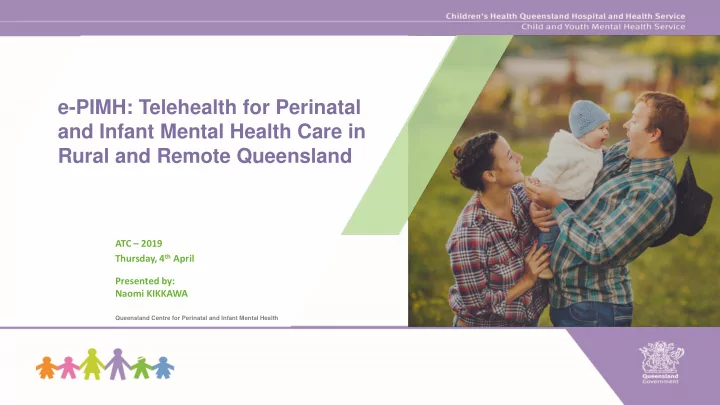

e-PIMH: Telehealth for Perinatal and Infant Mental Health Care in Rural and Remote Queensland ATC – 2019 Thursday, 4 th April Presented by: Naomi KIKKAWA Queensland Centre for Perinatal and Infant Mental Health
Acknowledgement of Country I recognise the traditional custodians of the land and waters and pay respect to Elders past and present and emerging as we walk together towards a healthier future. I also acknowledge the richness of traditional birthing and parenting practices
Who are we? The Queensland Centre for Perinatal and Infant Mental Health (QCPIMH) aims to bring perinatal and infant mental health needs to the attention of policy-makers, decision- takers and the general community, to improve the emotional wellbeing of all Queensland parents, infants and young children, and their families. Key Directions: 1. Service development and implementation 2. Workforce development 3. Mental health promotion and prevention 4. Research and evaluation 5. Advocacy
What is Perinatal Mental Health? Perinatal mental health refers to parents’ mental health from preconception until 24 months after the end of pregnancy. Perinatal Period Birth Aged 2 Conception Preconception Pregnancy After birth (Antenatal) (Postnatal) Infant Mental Perinatal Parent – Infant Health Mental Relationship Health
What is Infant Mental Health? Infant Mental Health: Refers to the mental health and emotional wellbeing of the baby from birth until 4 years Perinatal Parent – Infant Infant Mental Mental Relationship Health Health • Refers to the capacity of the infant to form close and secure relationships • Is the ability for the infant to express, experience and regulate their emotions “Feeling lovingly protected is the cornerstone of early mental health” (Lieberman & Van Horn, 2008)
e-PIMH Telepsychiatry Connecting Care to Recovery 2016 - 2021 e-PIMH Rural and Remote Strategy NPDI funding
What is e-PIMH? e-PIMH Pilot was delivered from Brisbane and provided: Non-clinical advice and support via telephone, email and video conferencing Training and education via video conferencing or, on site when possible Visits to rural and remote sites when appropriate The aim of e-PIMH Pilot was to: • provide non-clinical advice and support • work in collaboration with rural and remote service providers • Foster understanding and raise awareness of perinatal and infant mental health • Provide tailored training and education to respond to local needs • facilitate linking of local referral pathways
e-PIMH Telepsychiatry – not your traditional model • Is a partnership • Provides access to Perinatal and Infant/Child Psychiatrists for secondary consultations – clinical governance remains with the local service provider • Aim is to help local service providers support the emotional health and wellbeing of parents/carers and their families(conception to 2 years postpartum) and infants and young children (0 – 4 years) • Is NOT a crisis service • Help build local workforce capacity across sectors and along the continuum of care • Support local referral pathways and connections
What makes e-PIMH different? Some Mental Health Models e-PIMH Work directly with consumer Works with local service providers Hold clinical governance Clinical governance remains with local service provider Provide access to advice from either an adult Provides access to advice from BOTH an adult consultant specialist or a child specialist psychiatrist and an infant/child psychiatrist Have an identified consumer/case Can be a de-identified case study/consumer discussion Referrals come from the mental health clinician or GP Works across sectors (e.g. child health, GPs and NGOs) and only along the continuum of care (primary care through to quaternary care) Are limited to clinical input only Can provide non-clinical follow up support through provision of resources, linking to local service providers and training and education
The Case Study:
Challenges Different systems not designed to work together – record keeping, clinical governance How do we provide support in a way that is useful? Important to respect local policies and procedures When is it ok to break confidentiality? e-PIMH is not a crisis service, does not holding clinical governance and is a secondary consultation service with no local authority Inter-professional collaboration Cultural sensitivity
Moving Forward… • North Queensland • Evaluation • What can be learned from the evaluation? • How can the service continue to be improved? • Important to ensure it is responsive to the changing environment – need to be adaptive • Innovation in problem solving • Continue to work across sectors and along the continuum of care with the consumer journey at the centre
Thank you For more information contact: Naomi Kikkawa Tel: (07) 3266-3100 Email: e-PIMH@health.qld.gov.au
Recommend
More recommend